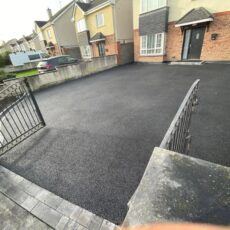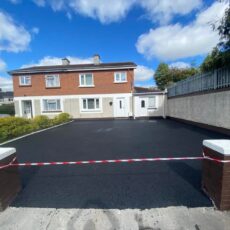Choosing the right paving material for your Dublin property is an important decision. After all, a well-paved driveway, patio, or path not only enhances the functionality and visual appeal of your outdoor space but also adds value to your home.
In Dublin, where the climate, local regulations, and urban landscape play significant roles, property owners and real estate developers often end up comparing two primary paving options: asphalt vs. concrete. Both offer distinct advantages and disadvantages, and understanding these differences is crucial for making an informed selection. This comprehensive guide will delve into the world of asphalt and concrete paving in Dublin, equipping you with the knowledge to choose the perfect option for your needs.
Asphalt Paving: A Smooth and Cost-Effective Choice
Asphalt paving is a mixture of aggregate stone, sand, and asphalt binder, which is a petroleum product. This combination is heated and laid down on the designated area and then compacted to create a smooth, solid surface.
What Are the Advantages of Asphalt?
Asphalt offers several attractive benefits for Dublin property owners. Perhaps the most significant advantage is its cost-effectiveness. Compared to concrete, asphalt is generally cheaper to install, making it a budget-friendly paving option.
Additionally, its quick setting time and durability make it a preferred choice for many, especially for high-traffic areas like driveways and roadways. Since asphalt installation is typically quicker, minimal disruption to property and daily routine can be expected.
Asphalt also boasts a smooth, seamless finish that provides excellent driving and walking experiences. Its flexibility also contributes to some degree of crack resistance, especially when compared to concrete.
Another advantage of asphalt paving is its relative ease of repair. Patching minor cracks or potholes in asphalt is a simpler and less labour-intensive process compared to concrete repairs. Furthermore, asphalt installation is typically quicker than concrete, minimising disruption to your property and daily routine.
What Are the Disadvantages of Asphalt?
One key drawback is the need for more frequent maintenance. Unlike concrete, asphalt requires periodic resealing, usually every 4-7 years, to maintain its flexibility and prevent cracks. This resealing process incurs additional costs throughout the lifespan of the pavement.
Another disadvantage of asphalt is its shorter lifespan compared to concrete. While properly installed and maintained asphalt pavements can last 15-20 years, concrete can often surpass 30 years.
Additionally, asphalt can soften during periods of extreme heat, potentially leading to surface deformation. Finally, some may find the classic black colour of asphalt less visually appealing than some of the design options available with concrete.
Concrete Paving: Durable and Aesthetically Versatile
Concrete is a widely used construction material composed of cement, sand, gravel, and water. When mixed, these elements form a rigid and durable material ideal for a variety of applications, including paving driveways.
What Are the Advantages of Concrete?
The primary advantage of concrete paving is its exceptional durability. Concrete pavements are known to last significantly long, often exceeding 30 years with proper care. Its durability makes it a robust option for a variety of applications beyond driveways, including patios, paths, and even interior floors. While it may come with a higher upfront cost, its minimal maintenance needs make it a cost-effective solution over its lifespan.
Another major benefit of concrete is its design versatility. Unlike the classic black asphalt, concrete offers a wider range of aesthetic possibilities. Coloured concrete can be used to create visually striking driveways and patios that complement the style of your property. Additionally, stamped concrete allows for the creation of unique patterns and textures that mimic the look of natural stone or cobblestones. This design flexibility allows you to personalise your outdoor space and enhance its curb appeal.
In terms of maintenance requirements, concrete generally only needs occasional cleaning and minor crack repairs. Its minimal maintenance needs make it a cost-effective solution over its lifespan
What Are the Disadvantages of Concrete?
Concrete, while popular for its strength and durability, does have its set of disadvantages when compared to other driveway materials. One significant drawback is its susceptibility to cracking, which occurs not only from improper installation but also from external factors such as excessive weight, movement in the ground, or even natural weather conditions like freeze-thaw cycles. These cracks can be challenging and costly to repair, often requiring extensive work to ensure the structural integrity and aesthetic appeal of the concrete surface are restored.
Another area where concrete might not be the ideal choice relates to its installation process. Unlike asphalt and tarmac, which can be laid and ready for use in a considerably shorter timeframe, concrete paving demands a longer and more disruptive installation process. This includes a curing period that can extend up to a week or more during which the surface cannot be used. This extended downtime may not be convenient for everyone, posing a significant inconvenience compared to other quicker-to-install materials.
Moreover, safety concerns with concrete surfaces are not to be overlooked. They can become extremely slippery in wet conditions, posing a hazard to vehicles and pedestrians alike. Although this risk can be mitigated by applying a textured finish or incorporating non-slip additives into the concrete mix, these solutions add to the overall cost and maintenance of a concrete driveway. Such additional measures, while effective in reducing the risk of slips and falls, underscore the need for careful consideration when choosing concrete for areas frequently exposed to water or ice.
Asphalt vs. Concrete: Comparative Analysis
As shown above, both driveway materials come with their own sets of advantages and drawbacks, impacting cost, maintenance, durability, and aesthetic appeal. In this section, we’ll provide more details to help you make an informed decision.
Installation Time and Costs
Each material’s installation time and costs are significant factors that weigh heavily on your decision based on immediate budget constraints and long-term financial planning.
The initial cost of asphalt paving is generally lower than that of concrete, due to the lower material and labour costs. Asphalt can also be installed relatively quickly, often within a day for a standard-sized driveway, and is ready for use much sooner than concrete, which can take up to a week to cure.
Although concrete is more expensive to install than other materials, it offers a better return on investment over time. The infrequent need for repairs and its longevity (30 years or more with proper maintenance) may offset the initial investment over time.
Durability and Longevity
When it comes to durability, both materials offer considerable strengths. Asphalt is flexible, which makes it less susceptible to cracking under pressure or due to ground movements. However, its lifespan is shorter, typically between 15 to 20 years, requiring more frequent resurfacing or replacement.
Concrete shines in longevity and resistance to wear and tear, easily lasting 30 years or more when properly maintained. It stands up well to heavy use but can be prone to cracking with extreme temperature fluctuations. For Dublin’s climate, where freeze-thaw cycles are common, this can be a consideration worth noting.
Maintenance and Repair
Maintenance is where asphalt and concrete significantly differ. Asphalt driveways need to be seal-coated every two to five years to protect against water penetration and to maintain its appearance. This maintenance can add to the total cost of ownership over its lifespan.
Meanwhile, concrete requires less frequent upkeep. It does not need sealing as often as asphalt, especially in mild climates. But any stains or fluids must be cleaned promptly to avoid permanent discolouration. Furthermore, cracks, when they occur, can be more challenging and costlier to repair than those in an asphalt surface.
Environmental Considerations
Sustainability is increasingly becoming a critical factor in choosing building materials. Asphalt paving, though not usually praised for its environmental benefits, can be recycled effectively, potentially reducing the need for new raw materials and lowering greenhouse gas emissions associated with its production.
Concrete is noted for its reflectivity, which reduces the need for lighting at night and can lower temperatures in urban areas. However, the cement production process is energy-intensive and contributes significantly to carbon dioxide emissions. Newer, more environmentally friendly cement mixtures are being developed, which may help mitigate these concerns.
Aesthetics and Customisation
Aesthetics play a pivotal role in the selection process for many property owners. Asphalt offers a classic, uniform look that blends well with most property styles. Its options for customisation are limited, though creative bordering and the introduction of aggregate for texture can enhance its appearance.
Concrete’s versatility in aesthetics is unmatched. It can be stamped, coloured, and finished in numerous ways to mimic other materials such as brick, natural stone, or even wood. This flexibility allows property owners to tailor the paving to complement their property’s architectural style and landscape design, making concrete a popular choice for those prioritizing curb appeal.
Asphalt vs. Concrete: Cost Comparison
The initial cost of your project is likely a major deciding factor when choosing between asphalt and concrete for your Dublin property. Here’s a breakdown of the cost considerations for both materials, using figures specific to the Dublin market:
Material Cost
In Dublin, expect to pay around €50 to €80 per square metre for asphalt and €75 to €110 per square metre for concrete. This price difference can be significant, especially for larger paved areas like driveways or parking lots.
Installation Cost
Asphalt installation in Dublin is typically faster and less labour-intensive compared to concrete. This translates to lower labour costs. Asphalt installation costs generally range from €20 to €35 per square metre, whereas concrete installation can cost €30 to €45 per square metre.
Maintenance Costs
Asphalt requires more frequent maintenance than concrete. Regular resealing, typically every 4-7 years, is necessary to maintain its flexibility and prevent cracks. In Dublin, expect to pay €15 to €25 per square metre for asphalt resealing. These resealing costs add up over the lifespan of the pavement.
If you are considering using these materials for your driveway, here’s what you can expect to spend:
Asphalt Driveway Costs Dublin
The cost of installing an asphalt driveway typically ranges from about €50 to €100 per square meter in urban areas like Dublin. This price includes both material and labour costs. The lower end of this range may apply to more straightforward projects with minimal preparation work required. Meanwhile, the higher end of the range aplly to larger, complex projects involving features like custom edging, extensive excavation, or thicker asphalt layers for heavy traffic loads.
Concrete Driveway Costs Dublin
In contrast, concrete driveways usually cost between €80 to €120 per square meter. This price range recognizes concrete’s higher material cost and the additional labour required for its installation. The variances in price can also reflect the choice of finish or the addition of decorative elements, which can elevate the aesthetic appeal and the cost.
It’s crucial to note that these figures are indicative and can vary based on several factors, including the scale of the project, geographical location within Dublin, and the choice of contractor. Additionally, while asphalt might be more affordable initially, concrete driveways typically offer a longer lifespan and may require less maintenance over time, potentially leading to cost savings in the long run.
Decision-Making Table for Choosing Between Asphalt and Concrete
Choosing between asphalt and concrete for your Dublin driveway can be a tough call. As such, we’ve created the table below to provide a quick reference to key factors that can help you make an informed decision:
| Factor | Asphalt | Concrete |
| Budget | More cost-effective upfront | Higher initial cost but fewer maintenance costs |
| Intended Use | Suitable for driveways and high-traffic areas | Ideal for patios, paths, and where aesthetics are key |
| Aesthetics | Limited customisation | High customisation and versatility |
| Maintenance | Requires regular maintenance | Less maintenance but harder to repair |
| Climate Resilience | Suitable for colder climates; quick to show wear | Susceptible to cracking in freeze-thaw conditions |
Asphalt vs. Concrete: Top Tips from Professional Paving Contractors in Dublin
Still can’t decide which paving material to use? Here are some insights from experienced Dublin pavers to help you make the best choice:
Budget Considerations
Asphalt’s lower upfront cost can be very attractive, especially for budget-conscious homeowners. However, remember to factor in the recurring costs of resealing every 4-7 years, which can add up over the lifespan of the pavement (resealing typically costs €15-€25 per square metre in Dublin).
Long-Term Investment
If you prioritise a long-term solution and a lower overall cost over time, concrete might be the better choice. While the initial installation is more expensive, concrete’s extended lifespan (often exceeding 30 years) and lower maintenance requirements can translate to significant savings compared to asphalt’s shorter lifespan (typically 15-20 years) and need for resealing.
Project Size Matters
The cost difference between asphalt and concrete becomes more significant for larger projects like driveways or parking lots. For smaller pathways or patios, the price gap might be less noticeable. In these cases, you can prioritize your preferred material based on aesthetics or other factors.
Seek Professional Advice
Consult with reputable Dublin paving contractors. They can assess your specific needs, property, and budget to recommend the most suitable option for your driveway or pavement project.
Consider the Look
Do you prioritise a clean black look or prefer the design flexibility offered by coloured or patterned concrete?
Think About Maintenance
Asphalt requires more frequent maintenance, while concrete repairs can be more extensive. Consider your tolerance for upkeep when making your decision.
In conclusion, the choice between asphalt and concrete for your Dublin property entails a careful consideration of your immediate and long-term needs. Budget, intended use, desired aesthetics, maintenance, and local climate are critical factors to weigh.
Asphalt may suit those looking for a cost-effective, quick solution, particularly for driveways that need to withstand heavy use. Concrete, with its durability, low maintenance, and aesthetic versatility, can be the ideal choice for those planning for the long term, offering a premium finish that enhances property value.
Exploring your paving options with a professional can provide tailored advice and insights specific to your property’s requirements. Whether asphalt or concrete, the right choice will enhance your Dublin property’s functionality, appeal, and overall value for years to come.
Ready to transform your Dublin driveway or patio with a stunning and durable surface? Don’t get stuck in the asphalt vs. concrete dilemma! Let our experienced paving contractors guide you through the pros and cons of each, ensuring you make an informed decision tailored to your property’s needs and aesthetics. Call us now at (01) 4851582 or 0852139591 to schedule a consultation!




